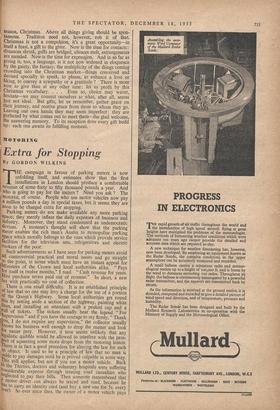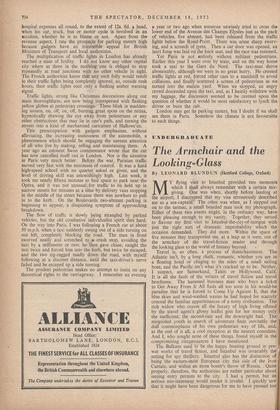MOTORING
Extra for Stopping
3y GORDON WILKINS HE campaign in favour of parking meters is now unfolding itself, and estimates show that the first installations in London should produce a comfortable I revenue of some forty to fifty thousand pounds a year. And who is going to pay for the meters ? Need you ask ? The tmotorist, of course. People who use motor vehicles now pay a million pounds a day in special taxes, but it seems they are soon to be charged extra for stopping. Parking meters do not make available any more parking ,pace; they merely inflate the daily expenses of business and Industry. Moreover, they stand condemned as undemocratic devices. A moment's thought will show that the parking Meter enables the rich man's Austin to monopolise parking 'space which morally belongs to the vans which provide service facilities for the television sets, refrigerators and electric Cookers of the poor. Such advertisements as I have seen for parking meters avoid all controversial practical and moral issues and go straight to the point, in terms which must have an instant appeal for Ministers of the Crown and local authorities alike. " Pays or itself in twelve months," I read. " Cash revenue for years. .dire purchase terms paid out of revenue." In short, a new tax with practically no cost of collection. , There is one small difficulty. It is an established principle L ef law that no one may levy a charge for the use of a portion of the Queen's Highway. Some local authorities get round this by setting aside a section of the highway, painting white klines, and installing an attendant with a peaked cap and a oll of tickets. The tickets usually bear the legend " For apervision " and if you have the courage to say firmly, " Thank qou, I do not require any supervision," the collector usually knows his business well enough to drop the matter and look for easier prey. However, it now seems unlikely that any legalistic quibble would be allowed to interfere with the pros- Peet of squeezing some more drops from the motoring lemon. There is in fact a good precedent for altering the law for such An object. It used to be a principle of law that no man is lable to pay damages until he is proved culpable in some way. This still applies, but not if you use a motor vehicle. Back in the Thirties, doctors and voluntary hospitals were suffering considerable expense through treating road casualties who lleglected 'to_pay their bills. Then someone remembered that motor driver can always be traced and sued, because he as to carry an identity card (and buy a new one for 5s. every Sear). So ever since then, the owner of a motor vehicle pays hospital expenses all round, to the extent of 12s. 6d. a head, when his car, truck, bus or motor cycle is involved in an accident, whether he is to blame or not. Apart from the revenue aspect, I rate the prospects for parking meters high because gadgets have an irresistible appeal for British Ministers of Transport and local authorities.
The multiplication of traffic lights in London has already reached a state of futility. I do not know any other capital city where at three in the morning one is obliged to stop repeatedly at road junctions with no other vehicle in sight. The French authorities know thht any such folly would result in their traffic lights being completely ignored, so, outside rush hours, their traffic lights, emit only a flashing amber warning signal.
Traffic lights, strung like Christmas decorations along our main thoroughfares, are now being interspersed with flashing yellow globes at pedestrian crossings. These blink in madden- ing unison, on, off, on, off, burning great spots on the retina, hypnotically drawing the eye away from pedestrians or any other obstructions that may lie in one's path, and turning the streets into a kind of mechanised caricature of Hallowe'en.
This preoccupation with gadgets emphasises, without alleviating, the increasing uselessness of the automobile, a phenomenon which should be engaging the earnest attention of all who live by making, selling and maintaining them. A year ago an eminent Swiss commentator wrote that the car has now cancelled itself out in London. Nor is the situation in Paris very much better. Before the war, Parisian traffic moved very fast with the minimum of control. It was a hard high-speed school with no quarter asked or given, and the level of driving skill was astonishingly high. Last week, it took me nearly fifteen minutes to find space to park near. the Opera, and it was not unusual for traffic to be held up in narrow streets for minutes at a time by delivery vans stopping in the middle of the street because there was nowhere to pull in to the kerb. On the Boulevards two-abreast parking is beginning to appear, a disquieting symptom of approaching breakdown.
The flow of traffic is slowly being strangled by parked vehicles, but the old combative individualist spirit dies hard. On the way into Paris, I was following a French car at about 50 m.p.h. when a taxi suddenly swung out of a side turning on our left, completely blocking the road. The man in front swerved neatly and screeched to a, crash stop, avoiding the taxi by a millimetre or two; he then gave chase, caught the taxi twice and forced him into the kerb, but twice he escaped, and the two zig-zagged madly down the road, with myself following at a discreet distance, until the taxi-driver's nerve failed and he escaped up a side turning.
The prudent pedestrian makes no attempt to insist on any theoretical rights to the carriageway. I remember an evening a year or two ago when someone unwisely tried to cross the lower end of the Avenue des Champs Elysees just as the pack of vehicles, five abreast, had been released from the 'traffic lights below the Rond-Point. There was some sharp swerv- ing, and a screech of tyres. Then a car door was opened, an inert form was laid on the back seat, and the race was resumed.
Yet Paris is not entirely without militant pedestrians. Earlier this year I went over by• train, and on the way home took a taxi to the Gare du Nord. The taxi-man drove abominably, although we were in no great hurry. He crossed traffic lights at red, forced other cars to a standstill 'to avoid collisions, and finally scattered a screen of pedestrians as we turned into the station yard. When we stopped, an angry crowd descended upon the taxi, and, as I hastily withdrew with my luggage, the discussion seemed to be centred upon the question of whether it would be most satisfactory to lynch the driver or burn the cab.
London may get its parking meters, but I doubt if we shall see them in Paris. Somehow the climate is not favourable to such things.











































 Previous page
Previous page